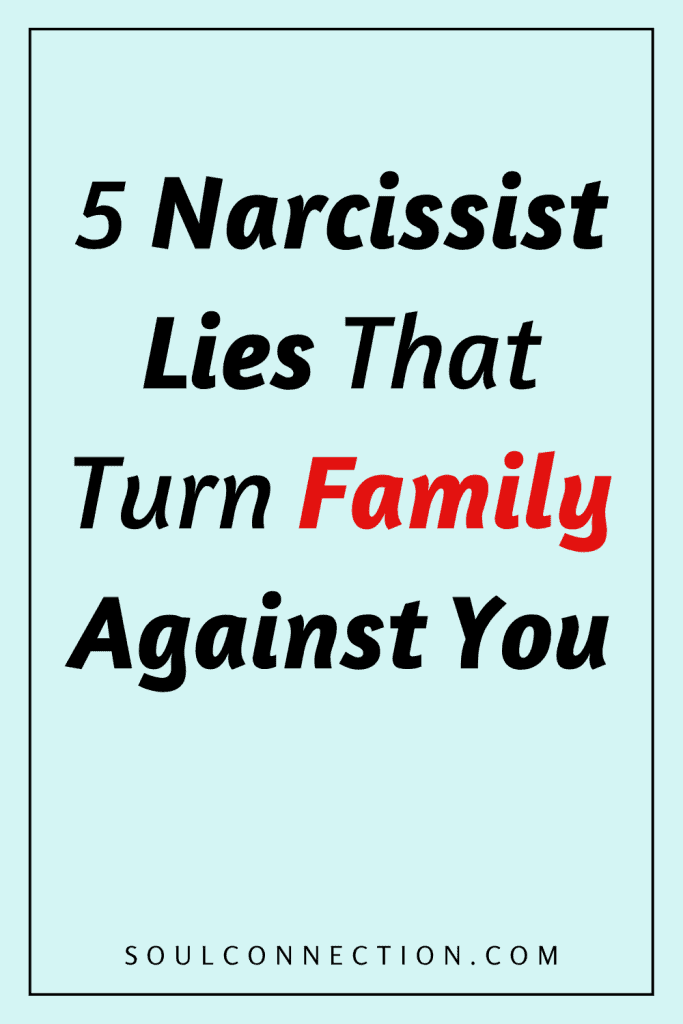Narcissists. The word alone sends a small shudder down most spines—unless, of course, you’re talking to a narcissist, in which case they’re probably too busy admiring their own spine to notice yours.
When it comes to family dynamics, narcissists wield manipulation like a circus performer with flaming batons. But perhaps their greatest trick? Convincing the people you love most that you’re the villain in your own story.
Wondering why Aunt Mabel’s giving you side-eye at dinners or why your sister suddenly believes you’re a monster?
Grab a cuppa, because it’s time to shine a light on the five biggest lies narcissists tell to turn family against you—and how you can spot the smoke before it becomes a full-blown house fire.
1. They Say You’re the “Crazy” One
Classic narcissist move: gaslighting so hard, you start questioning whether you really did try to poison the Thanksgiving stuffing with “a vibe.”
The moment you start to notice things feeling off in the relationship, the narcissist springs into action. Suddenly, you’re not stressed, you’re “unstable.” You’re not setting boundaries, you’re “overreacting.”
This lie is especially insidious because it’s sprinkled into conversations with family members when you’re not around.
“I’m really worried about them,” the narcissist will confide, clutching imaginary pearls. “They’ve been so emotional lately, I just don’t know what to do.”
Why does it work? Because family wants to help. The narcissist’s crocodile tears and dramatic sighs activate the rescue instinct in others.
Before you know it, your family is watching you for signs of meltdown, and your every sigh is proof that the narcissist had a point.
What actually helps? Keep a record—yes, an actual notebook, because our brains are not court stenographers. Fact-check yourself and confide in someone outside the narcissist’s sphere of influence.
When you know what really happened, you’re less likely to internalize the “crazy” narrative, and you can calmly set the record straight if needed.
2. They Rewrite History to Make You the Villain
Ever had an argument with a narcissist, only to hear about it later and wonder if you were both in the same room? Welcome to the world of revisionist history—the narcissist’s favorite bedtime story.
Here’s how it works: perhaps you once asked for help during a tough time. In the narcissist’s retelling, you became demanding, unreasonable, even cruel.
Your genuine grievances are recast as wild accusations; your need for support becomes evidence of your selfishness.
This kind of storytelling doesn’t just warp the truth; it drops a wedge right into the Sunday roast. Family members hear these tales often enough, and suddenly, you’re the one who’s “always starting drama.”
Counteracting this one takes time, but there’s hope. Whenever possible, communicate directly with family. Share your side—not defensively, but as matter-of-factly as discussing the weather.
“Funny, that’s not how I remember it. Here’s what happened from my perspective…” It’s not about winning the argument; it’s about gently inviting others out of the narcissist’s funhouse mirror.
3. They Portray Themselves as the Victim
If there’s an Oscar for Best Dramatic Performance in a Family Setting, the narcissist’s acceptance speech would be longer than a holiday road trip with no snacks.
They thrive on sympathy and attention, and what better way to get it than by painting themselves as your hapless victim?
Maybe you set a simple boundary—like not answering calls after 10pm because, you know, sleep is a thing. Next thing you know, the narcissist is telling your family you’ve “cut them off” and “don’t care anymore.”
Suddenly, you become the cold-hearted one, while they bask in family consolation. This narrative flips your boundaries into cruelty, and your self-care into neglect. It’s not subtle, but it’s surprisingly effective.
Reversing the damage starts with clear communication. When relatives ask about your “distance,” explain the reasoning behind your boundaries, without making it a battle.
“I love you guys, but I need rest so I don’t turn into a zombie at work. Nothing personal!” A touch of humor goes a long way to defusing the drama.
4. They Claim You’re the Manipulator
There’s nothing a narcissist loves more than a reversal of roles—especially if it means pinning their own bad behavior on someone else.
Projection is the name of the game: if they’re manipulating, then you must be the true puppet master pulling all the strings.
Expect to hear things like, “They always twist things to make me look bad,” or, “They’re so controlling, I can’t do anything right!” delivered with all the conviction of a soap opera star.
This particular lie is designed to preempt any complaint you might raise. The minute you start to describe your experiences, your family’s already primed to see you as the master manipulator.
After all, the narcissist warned them about you.
Break this pattern by staying calm, even when you’d rather turn the dinner table into a WWE ring. When the manipulation narrative surfaces, refuse to take the bait. “I think there’s been a misunderstanding.
My intention was…” Then pause, let it sit. The less you engage with the drama, the less oxygen it gets.
5. They Twist Your Empathy Into Weakness
Ever found yourself called “too sensitive” or “unable to take a joke” after expressing hurt? Narcissists are experts at reframing empathy as a fatal flaw.
The more you show compassion, the more they spin it as evidence that you’re not cut out for the harsh realities of life—unlike them, of course, who are somehow both the toughest and most misunderstood person in every room.
This lie often worms its way into family dynamics. Suddenly, your cousin looks at you with pity (or worse, annoyance) every time you try to have a real conversation about feelings.
Resist this gaslighting by owning your empathy. “I care deeply, and I’m not ashamed of it.” Then get on with your day.
Empathy is a superpower, not an Achilles heel—especially when everyone else is too busy clutching pearls to notice the storm in the teacup.
Turning the Tables on Narcissist Narratives
Every family has its drama, but when a narcissist is running the script, the plotlines can start to feel like a season finale that never ends.
Recognizing these lies isn’t about winning family popularity contests; it’s about keeping a grip on your own reality.
Keep conversations as transparent as possible. Share your experiences with people you trust—ideally those who haven’t already bought season tickets to the narcissist’s show.
Small, steady reminders of the truth are more powerful than any single grand gesture.
And above all, keep your sense of humor. It won’t solve everything, but it will keep you sane. You might not be able to stop a narcissist from spinning their web, but you can refuse to get tangled up in it.
Here’s to living your truth, one family gathering at a time.


